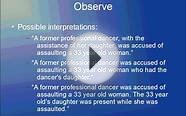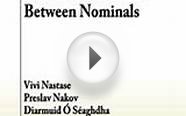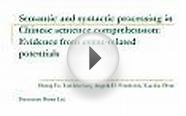
Semantic in a sentence
We describe a novel approach to precise searching in the full content of digital libraries. The Searchbench (for search workbench) is based on sentence-wise syntactic and semantic natural language processing (NLP) of both born-digital and scanned publications in PDF format. The term born-digital means natively digital, i.e. prepared electronically using typesetting systems such as LaTeX, OpenOffice, and the like. In the Searchbench, queries can be formulated as (possibly underspecified) statements, consisting of simple subject-predicate-object constructs such as ‘algorithm improves word alignment’. This reduces the number of false hits in large document collections when the search words happen to appear close to each other, but are not semantically related. The method also abstracts from passive voice and predicate synonyms. Moreover, negated statements can be excluded from the search results, and negated antonym predicates again count as synonyms (e.g. not include = exclude).
In the Searchbench, a sentence-semantic search can be combined with search filters for classical full-text, bibliographic metadata and automatically computed domain terms. Auto-suggest fields facilitate text input. Queries can be bookmarked or emailed. Furthermore, a novel citation browser in the Searchbench allows graphical navigation in citation networks. These have been extracted automatically from metadata and paper texts. The citation browser displays short phrases from citation sentences at the edges in the citation graph and thus allows students and researchers to quickly browse publications and immerse into a new research field. By clicking on a citation edge, the original citation sentence is shown in context, and optionally also in the original PDF layout.
To showcase the usefulness of our research, we have a applied it to a collection of currently approx. 25, 000 open access research papers in the field of computational linguistics and language technology, the ACL Anthology ( The Searchbench user interface is a web application running in every modern, JavaScript-enabled web browser, also on smart phones and tablet computers. The system is a free and public service at Because the NLP technology is domain-independent, it could also be applied to newspaper texts, technical documentation, or scientific publications from other disciplines. The aim of this paper is to make the benefits of this new, language technology based approach known in library research and related fields.
This article summarises 9 peer reviewed publications from the past three years that have been published in international conferences and workshops in the area of computational linguistics, and tries to present them in an appropriate way to the LIBER audience. The original papers contain more details and are freely available from the author’s homepage [1] or via the Searchbench [2].
You might also like









